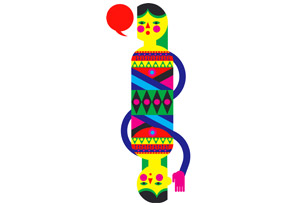Does a twitching eyelid warrant a trip to the doctor's office? Probably not. But your occasional tics, pops, and hiccups are clues worth listening to. We investigated five common quirks that might signal health issues.

Illustration: Patrick Hruby
Leg Cramps
Translation: A long day in high heels or shoes with poor arch support can strain your calf muscles, which may lead to cramps and even painful charley horses hours later. Another possible culprit is an electrolyte imbalance in your body's fluids, typically brought on by dehydration.
Remedy: Sufferers have been known to try everything from taking the antimalarial drug quinine to sticking a bar of soap under their pillow. For better results, focus on good shoe support, proper hydration, and eating a diet rich in electrolytes like calcium, potassium, and magnesium (think bananas and nuts). To calm a charley horse, sit on the floor with legs straight and flex your foot toward your shin to stretch the calf.
See a doctor if...you get leg cramps on a weekly basis, or they are so severe they regularly disrupt your sleep. Some medications can impact your electrolyte balance, which makes chronic cramps worth discussing with your doctor.
Hiccups
Translation: Hiccups happen when your diaphragm, the muscle that separates your chest from your abdomen, suddenly contracts, resulting in an abrupt closure of your vocal cords. The diaphragm is controlled in part by the vagus and phrenic nerves, and experts believe that irritation of those nerves—by, say, your distended stomach after a big meal—is what causes the muscle to spasm. "Hiccups can be a cue that you've eaten too much," says Heather Agee, MD, at Johns Hopkins Bayview Medical Center. Nervousness and excitement are other possible triggers, as they can also cause the diaphragm to contract.
Remedy: Though there's no scientific cure, you may be able to quiet hiccups by interrupting your breathing patterns (hold your breath), stimulating the back of your throat (gargle water), or compressing your diaphragm (pull your knees up to your chest).
See a doctor if...your hiccups last longer than 48 hours, which could signal a more serious issue, such as a central nervous system disorder.
Next: The causes of eyelid twitches, jaw popping, and light-headedness
Eyelid Twitches
Translation: The exact cause of a muscle spasm in the eyelid remains a mystery, but doctors point to the holy trinity of stress, fatigue, and caffeine.
Remedy: Fewer mugs of coffee, a bit more sleep, and less time spent strapped to your desk chair should relieve the tic in a day or two.
See a doctor if...other parts of your face start twitching. A persistent facial tic may be a symptom of a calcium deficiency or a neurological condition like Parkinson's.
Jaw Popping
Translation: When you stretch a joint, small bubbles of gas are released, which may result in a snap, crackle, or pop. If that sound emanates from your jaw, though, it could be that you're grinding your teeth at night, which can lead to stiff jaw muscles and displacement of the disk in your temporomandibular joint—conditions known as TMJ disorders (TMD).
Remedy: Occasionally sounding like a bowl of Rice Krispies isn't cause for alarm. But if you have persistent popping, you might want to try a mouth guard to stop night grinding.
See a doctor if...the noise is accompanied by reduction in mobility or persistent tenderness. A variety of treatments (from muscle relaxants to cognitive behavioral therapy) have been used to manage TMD.
Light-Headedness After Standing Up
Translation: When you stand up after sitting or lying down for a period of time, blood can pool in your lower extremities, and if your brain is momentarily deprived of regular blood flow as your circulation returns to normal, you'll feel a little dizzy. Low blood pressure can increase your odds of wooziness; it may be triggered by dehydration, which lowers blood volume, or high temperatures, which prompt your blood vessels to dilate. "If you're a little dehydrated and standing in a stuffy room, light-headedness is not at all uncommon," says Susan Joy, MD, director of women's sports health at the Cleveland Clinic.
Remedy: Drink plenty of water and stand up slowly, especially in warm environments. If you feel dizzy, sit down until you recover, and in the case of a more severe spell, lie down with your feet elevated above your heart.
See a doctor if...light-headedness occurs every time you stand up and persists for more than a day. Certain over-the-counter medications can cause mild dehydration, Joy points out; tell your physician about any drugs you take.
More Health Advice
As a reminder, always consult your doctor for medical advice and treatment before starting any program.




